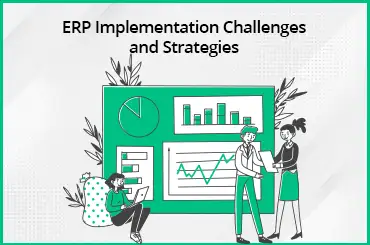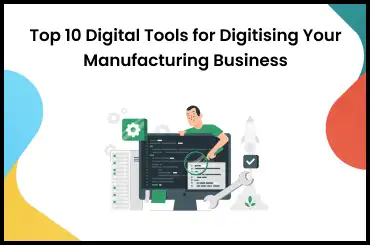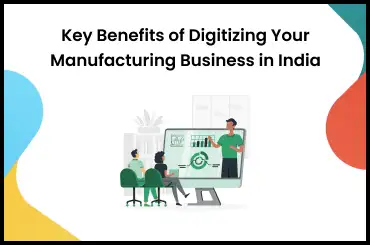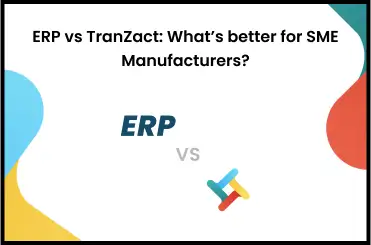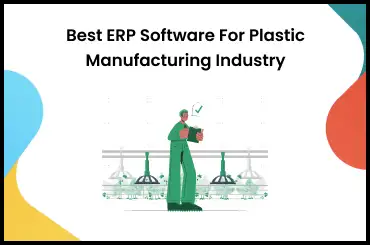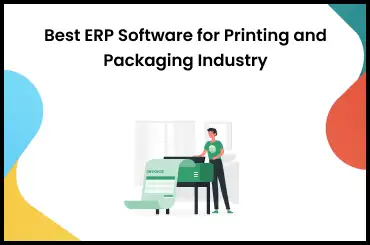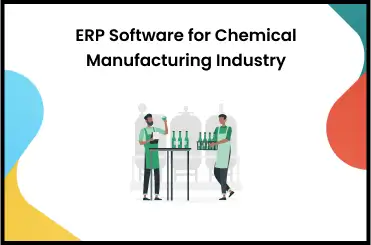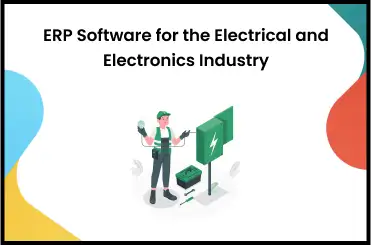In today's economic landscape when businesses are facing one of the worst slowdown, small businesses need to make data-driven decisions quickly to stay ahead of the competition. Enterprise Resource Planning (ERP) software helps businesses streamline and automate their business operations and focus on other strategic initiatives.
While many ERP systems are available in the market, choosing the best is important so that your business and production processes are not disrupted frequently. Therefore, we have curated a list of the best ERP software in India, for your easy reference.
We will look into the features and limitations of each tool, so that you can decide which ERP software will work best for your SME manufacturing business.
What Is an Enterprise Resource Planning (ERP) Software and What Does It Do?
Enterprise resource planning (ERP) is a software system used to organize and streamline daily business operations. ERP softwares help businesses by integrating key operational procedures into a single system, such as accounting solutions, manufacturing, sales, purchase, etc. and in some cases Human Resource Management.
Enterprise resource planning tools have improved to encompass business intelligence in the fast-paced business world. As a result, firms now need to establish a competitive edge over competitors and better control over business operations.
Best ERP Software In India
- TranZact
- Tally
- Oracle
- SAP
1. TranZact
TranZact is a zero-effort, business automation tool that digitizes the entire business process for an SME, from sales inquiry to dispatch. It does all that a modern ERP tool does but is significantly more powerful than an ERP.
It's focused on four core modules of a manufacturing business including sales, purchase, inventory and production. It comes with Tally Integration, to enable and manage easy accounting data flow. It's also integrated with Excel and other tools, thereby saving significant user time and is voted as one of the best ERP for small business in India.
Features:
- TranZact is a cloud-based tool that is easily accessible, and does not demand any advanced training to operate it. When compared to other ERP tools, it can be implemented quickly and used seamlessly by all employees in the organization. This makes it the best ERP software for a small business in India, where all teams and staff members may or may not be comfortable with highly complex tools.
- It offers all its base solutions for free to all users for an unlimited time, enabling them to explore and decide how well it fits with their needs. It is entirely up to the customer to upgrade and enjoy customized, additional services.
- TranZact's Business Intelligence dashboard helps customers to get a quick overview of how their business is performing with graphs and visual analysis. It also equips users to generate 70+ reports across solutions, enabling quick and data-driven decisions.
- TranZact runs on AWS cloud services that ensures 100% data security for all its customers.
- It also provides GST compliant invoicing and documentation solutions.
Limitations:
- TranZact is specifically suitable for SMEs. As of now, it does not cater to large businesses.
2. Tally ERP Software
Known for its accounting, stock control, reporting, and payroll functions, Tally Prime is one of the top erp software in india available today.
Features:
- It specially caters to accounting and ERP requirements of small-scale businesses across the world.
- It provides cash flow, reporting, payroll, credit management and other services.
- It offers credit management and inventory management services.
Limitations:
- It's more of an accounting software and is not integrated with materials planning and production planning modules.
- It demands trained professionals to operate on Tally as it is a complicated software.
- The costs involved in operating Tally are significantly higher.
3. Oracle ERP software
It is a cloud-based ERP and reporting software that helps global businesses to automate core business processes and gives visibility to operational and financial performances.
Features:
- It provides different modules such as Project & Risk Management, Compliance, Enterprise Performance Management, Supply Chain and Manufacturing.
- It offers solutions like big data, computing, risk management and financial management.
Limitations:
- Oracle ERP software will work best for you if you are a large-scale enterprise.
- For small and medium enterprises, the costs involved in its implementation are not very reasonable.
- Not all its solutions are relevant to manufacturing enterprises. Thus, it is not specifically recommended for SME manufacturing businesses.
4. SAP
SAP ERP is an ERP software designed to function on cloud-based and on-premise platforms. It is an end-to-end ERP enterprise resource planning software that streamlines business processes such as finance, sales, purchases, inventory management, etc.
Features:
- It offers accounting, financial management and supply chain solutions.
- It has a global presence covering a vast scope of industries.
- It offers human capital management and customer relationship management solutions.
Limitations:
- SAP is an expensive software that has high maintenance and upfront costs.
- Because of the complexity of the software, trained users are required to operate it.
- A lot of time is required for the implementation of this software.
Key Features of an ERP Software
Out of the many features of ERP software, here are the key ERP features that you should look out for when scouting for an ERP for manufacturing industry in India.
Integration
An ERP software centralizes all your business data and integrates various departments, so that all the information can be shared across in real-time.
Automation
An ERP software helps you automate repeatable tasks such as invoicing, inventory planning, procurement etc. It also helps in automated data sharing, which saves time and resources.
Data analysis & Reporting
It analyzes big chunks of data and translates them into actionable insights and reports. It further helps the stakeholders in taking decisions to optimize business operations.
Accounting
An ERP Software may also manage accounting activities such as accounts receivable, accounts payable, general ledger and budgets.
Different Modules in an ERP System
Procurement Module
A procurement or purchasing module helps your business to secure the items needed to manufacture or sell goods efficiently. It enables effective tracking of purchases and strengthens your supplier relations.
You can automate all your purchase workflows right from creating purchase orders to recording delivery of goods. You can also ensure inventory updation with the help of the procurement module.
Order Management Module
This is a subset of purchase or sales or transactions module and prevents your purchase and sales orders from going off-schedule. It enables you to manage and track all the orders right from their quotation state to their delivery.
Thereby, this module helps you to improve customer experience by auto-managing all your orders and boosting timely delivery rates.
Inventory Management Module
This module helps you to track the current as well as the incoming inventory and plan your purchases to ensure sufficient stocks at all times.
By managing outgoing stocks, you can keep track of the products in demand and deliver orders with high quality and without any delays.
Customer Relationship Management (CRM) Module
It is a storehouse for all customer information and customer support mechanisms. When dealing with a customer, it's important to have all the information handy such as the communication and purchase history.
Having a CRM system helps you to build and maintain relations with your customers through continued communication at appropriate times.
Accounting Module
It helps you to manage your general ledger, accounts payable and account receivable. The accounting module is crucial as it enables you to gauge your bookkeeping status and predict future business activities accordingly.
You can prepare accounting reports, profit and loss statements and more with this module.
Manufacturing Module
The manufacturing module is an important module as it ensures that everything needed for production, like raw materials, equipment and other supplies are readily available. You can also track good-in-progress, diverse production stages and supply with respect to the forecasted demand.
Instead of an embedded module within a complex ERP, manufacturing SMEs can opt for a full fledged manufacturing and ERP software like TranZact. It is the best digitization software with all functions of an ERP and more, designed specifically for small and medium-scale manufacturing companies.
Warehouse Management Module
It is an essential module for businesses that own and operate inventory stores or warehouses. It guides employees on how orders must be handled from materials planning to packaging. It also helps in labor planning as per expected order volumes, which enables faster delivery of orders. Other important modules that may be covered by ERPs include payments and finance module, management of supply chain, human resources, e-commerce, service resource, and marketing automation modules.
Types of ERP Systems
There are various types of ERP catering to the specific needs of enterprises, specific businesses, or industry requirements. Based on their distinct features, here's a rundown of different ERP softwares.
Cloud-based ERP software
A Cloud ERP software is managed by a software vendor and runs on an external secured server. It can be accessed via the internet and centralizes all the business data so you can access it anytime. The software provider offers ongoing assistance, upgrades, training, and adaptable customizations. You should consider a Cloud ERP, if:
- You seek fast implementation.
- You have a small or medium sized team of IT staff.
- You do not want to spend a higher amount.
On-premises ERP software
Unlike a cloud-based ERP software, an on-premises ERP software runs on your own servers, from locations you can control. Such software is preferred by companies that seek a higher control via their company-owned IT infrastructure.
You should consider an on-premise ERP, if:
- You have a strong and in-built IT infrastructure
- You operate from a single location
- You can't store your data on the cloud due to some regulation reasons.
Hybrid ERP software
It offers you the best of both worlds. That's why many organizations choose to combine both on-premise and cloud ERP environments. Organizations can expand their ERP software anytime and turn it into a hybrid model.
You should consider a hybrid ERP, if:
- You need to add cloud features to your existing on-premise ERP software.
- You have branches at other locations with one single centralized location.You need to integrate your ERP software with some web-based services.
Benefits of an ERP Software
An ERP software offers productive digitization for a business. When implemented quickly on the cloud, it can indeed fast-track end-to-end operations for any business. For SME manufacturing businesses, this can mean significant cost-savings and high returns. Let's discuss some of the ERP benefits in detail:
Enhances your productivity
An ERP software helps you to automate various business-related processes, such as bill generation, transaction management, customer communication, and more. When manual work is reduced, you not only save time but also minimize human errors and redundancies.
In addition, an ERP software becomes your go-to repository for all the business-related information, and is accessible in real time by all departments. All these benefits contribute to enhanced productivity for a business.
Reduces operational costs
Installing a generic ERP software can be expensive, but businesses are still investing in it. That's because of the savings that occur after installation. However, not all ERP software tools have to be expensive. TranZact is immensely affordable for SME businesses and can be implemented in 7 days.
Once implemented, ERP software systems contribute to significant savings, sometimes close to an average reduction in operational costs by 23%.
Integrates end-to-end information
An ERP software gathers and integrates all the information from various departments of your business. So no matter the size of your business, you can rely on the ERP to share accurate and consistent data across business verticals.
It makes the coordination between teams more effortless, and access to latest data helps in formulation of better decisions.
Keeps you ahead of the competition
An ERP software for a small manufacturing company, enhances business intelligence and enables it to stay ahead of competition. It provides you with data in real time and responds to changing demands seamlessly.
By reducing wastage, shaving down costs and enhancing customer service, it gives you the much-needed competitive advantage over the long term.
Makes your business compliant
You can also manage compliance with regulatory standards, with the help of an ERP software. It will automatically alert you if the business becomes non-compliant at any time by making your data audit-friendly.
Helps you generate reports
An ERP software uses visual mechanisms to showcase hidden insights from vast amounts of data. Basically, an expert ERP software would ideally help you to forecast effectively in order to strengthen your strategizing abilities.
Without extensive IT workforce resources, an ERP software helps you to identify patterns and generate insightful reports. Using these insights you can define key problems and solutions before it's too late.
Secures your data
A trusted ERP software is well equipped to protect your business from data frauds and breach. Since all your data is collected on secured servers, with complete supervision, your business data is more secure than otherwise stored in scattered locations.
All access points are safeguarded and closely monitored. And in case you sense any suspicious activity, you can readily spot the source and also deactivate the access in-time.
Enhances customer service
When you're operating in a highly competitive marketplace, the most important factor that sets your business apart from competitors, is the quality of customer service you provide to your users.
An ERP software helps you in improving your customer services, since you can access all customer details on one platform and monitor user behavioral patterns. This accelerates the search for customer experience history and makes it easier to address customer issues.
Scaling your business faster
As you plan to grow your business, an ERP software provides you with exceptional flexibility to add on new capabilities.
You can add new virtual teams, new modules to your existing system and also be prepared for potential challenges.
Operate business on mobile
Mobile ERP software enables employees to conveniently track business activities while they are on-the-go. They can stay updated with live insights about all functions at any point of time, from anywhere, without being heavily dependent on computer systems.
Improve collaboration between teams
ERP software helps in improving the collaboration between different teams and departments. With the centralized data system achieved through ERP, every team can collaborate on key functions with other teams.
This helps them to support each other proactively, resulting in improved productivity.
Challenges Faced While Implementing ERP System
ERP implementation transforms how an SME business operates completely. Hence, some challenges are bound to occur. Let's look at a few of these challenges:
Selecting the right ERP vendor
The foremost challenge is selecting the right ERP vendor who understands the industry you operate in and the nature of your business. An ERP tool combined with more value added services, which is trusted by fellow SMEs is undoubtedly the best one to go with.
Implementation time
ERP implementation is a time consuming process. Right from the initiation to the final deployment stage, the complete process of optimizing the system by most traditional ERP tools could go from about 6 to 9 months.
Therefore, it's key to align the implementation time with your business goals and go for a modern ERP tool with a shorter and efficient implementation time.
Inadequate testing
If you fail to test your software properly, you might end up losing strategic time and money. It's important to check that the system works for your business by testing it across use cases.
Resistance to change
As you implement the software, you also need to prepare your business for the changes that it brings. There might be natural resistance from some employees and decision makers.
Convincing everyone of the benefits of ERP software is crucial to its successful implementation.
*Related Read: Advantages and Disadvantages of ERP
How to Choose an ERP Software?
Before selecting an online ERP software in India, you must thoroughly research all the solutions offered by the vendor to be assured that it suits your business needs and that it can support your growth! It is also important to adopt a tool that is recommended by other SMEs in the industry. The following factors can support your decision while selecting an ERP tool:
Flexible and customizable
Considering the immediate and future goals of your business, it's important that your ERP software is capable of fitting to your evolving needs and is constantly updating.
To future-proof your business, choose an ERP software like TranZact that is highly customizable and can quickly adapt to your existing and upcoming business requirements and technology infrastructure.
Cloud-based and easy to use
Today, 24X7 accessibility to business information is critical to run a business efficiently and in real time. Along with a seamless cloud-based access, it's also important that the ERP tool is immensely easy to use for existing staff members of an SME business.
If your ERP software is complex, you might have to hire a professional to use it, which might add on to your existing costs.
Effective Integration
Today, a manufacturing business demands high collaboration and communication across different stages of production like inventory, material requirement planning, testing and production planning.
As a manufacturing ERP system, it's important for the software to be integrated with end-to-end modules and provide easy insight and control at all times.
Cost-effective
The cost of implementing and integrating software must also be kept in mind so that you don't end up spending excessive budgets on a software that doesn't fulfill all your business requirements.
Carefully assess the costs involved, such as maintenance costs, implementation costs, upgrade fees, etc. However, your data safety is also related to your chosen ERP software, so it's crucial to make a smart decision.
Fast Implementation
It's also highly advised to consider the implementation and data migration period while choosing the ERP software for your business.
Augment Business Efficiency by 10X
More manufacturing companies are maximizing their efficiencies by leveraging an ERP tool for everyday activities. An ERP tool provides an SME with critical value and empowers them to oversee core operations, prevent delays and provide improved customer experiences.
With a cloud-based ERP platform like TranZact, you can accelerate decision-making and increase productivity by 10X. It can be implemented easily in only 7 days and is trusted by over 10,000+ Indian SMEs.
If you're convinced about the value that a digitized ERP software can bring to your business, then now's the right time to try TranZact's ERP software for the manufacturing industry. It is truly the best ERP software for manufacturers!
FAQs on Best ERP Software in India
1. How do ERP Systems work?
An ERP system works as a central repository of all the data related to your business. It does so by collecting data from different departments of your business. Then, it processes the data in the back end and exchanges information with the related departments to fulfill business needs.
Essentially, it creates a single database for all business operations and makes the right data available to those who need it, for seamless manufacturing workflows.
2. Do manufacturing companies need ERP Software?
Yes. ERP software enables manufacturing companies to become more efficient in delivering the highest quality products. With ERP software for the manufacturing industry, business owners can speed up end-to-end business operations, plan production and inventory schedules better and ensure lowest possible costs.
3. Which is the best ERP software for manufacturers?
The best ERP software for manufacturers is one that operates in real time and is easy to use. For these reasons and more, TranZact is the best ERP software for manufacturing in India.
It offers a free sign up for all base modules wherein small manufacturing companies can explore the platform and start using it for free. They can upgrade only when they are assured of the power TranZact brings to their business operations.
TranZact is a cloud-based tool, integrated with all core manufacturing modules, including production, inventory and materials planning, digitizing entire business processes right from sales inquiry to dispatch.
Designed specifically for Indian SME manufacturers, TranZact is a digital transformation tool that is highly customizable, based on requirements of the manufacturing industry. 95% of TranZact users say it is extremely easy to use!
4. Which are the best ERP software companies in India?
Some of the best ERPs in India based on product reviews, and customer feedback include Tally Solutions Pvt. Ltd., TranZact, SAP India Pvt. Ltd., and Oracle India Pvt. Ltd.








